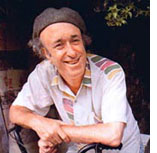By Dan Bloom

CHIAYI CITY, Taiwan — It’s not every day I get mail from a rabbi, but every once in a while it happens and I love it. It just so happens today I got mail from both a rabbi in Britain and a psychiatrist in Milwaukee whose son is a rabbi. I think today was meant to be, or as Steven Moffic, my Milwaulkee pal who I have written about before on this page, said to me in a postscript: “Danny, the older I get the less I think so-called ‘coincidences’ are random.”
But first to Britain, where Rabbi Jeffrey Newman, a new Twitter friend I met in my climate work with the new cli fi genre, tweeted me a very important tweet. Rabbi Newman is Rabbi Emeritus at Hinchley Reform Synagogue in the UK and an active Twitter tweeter and when he heard about the new cli fi genre term, he sent me a message in just 140 letters or so that read: “Your coinage of cli fi is a brilliant and important reframing.”
Reframing, I said to myself, what does he mean by “reframing?” I took if that he meant something like cli fi was reframing the discussion over climate change and global warming, from a literary perspective, but I wasn’t sure because the word as Rabbi Newman used was new to me.
So I asked him for a clarification and an amplification.
In Internet time, the good rabbi wrote over the seas and over the wires that carry email messages here and there: “Dan, your research tells it all and I’m no expert. I came across ‘reframing’ in some research I was doing,” he wrote.
It turns out that Rabbi Newman is a longtime climate activist in Britain and understood right away what the cli fi genre term was set up to be. He calls it a “reframing” — a term I like — and he explains it this way:
”As I understand it — and used it when I first came across your term of ‘cli-fi’ — it means thinking about something in a new way. What is clever, to me, in the term cli-fi is the double-take, the fact that it makes you re-think, ie. reframe,” he wrote.
”First, it suggests that all this climate talk is a fiction…then I realize sci-fi is not a fiction but an imagining of the present into the future,” he added, noting: ”At another level, your work on cli-fi, of seeing a genre and stimulating cultural interest and awareness in the future we are creating, is also of great importance.”
”Dan, I’m delighted to have come across your work. Climate change is real, it is happening now, the implications and speed are far greater than most of us wish or are able to face. But there is also a speed of change in the other direction, though, in one sense, it is already ‘too late’. I am glad that my simple word — ‘reframing’ — caught your imagination.”
It sure did. And more than that, or in addition to that, I now have a new Twitter pal in London.
Now back to Dr Moffic in Milwaukee, also in his mid-60s, and the father of a Chicago area rabbi himself. Dr Moffic wrote to me because he had just left a comment on Andrew Revkin’s climate blog at the New York Times that was discussing the cli fi meme, and Steve wrote:
”In mentioning “cli-fi” at the beginning of this post, Andy touched on a genre that is on the verge of overcoming our natural tendency to ignore problems in the distant future. This natural, inbuilt tendency is one of the psychological obstacles to addressing climate change.
It’s been hard to imagine and be concerned with environmental changes so distant and slowly developing,” Dr Moffic wrote, adding:
”Now, the rise in climate instability around the world – temperature changes, floods, tornadoes, typhoons, fires, etc. – is one development that makes these risks more real. But, another is the growing cli-fi novels and movies. Especially movies, since they are such a popular media. The recent Time magazine has a feature story on this, and that indefatigable journalist from Taiwan, Dan Bloom, was interviewed about this for the magazine, too.”
“Climate fiction, that is to say, ‘cli fi’, has the unique capability to make the future seem real and thereby take an end-around on our avoidance and denial,”Dr Moffic concluded.
So in one day, two email chats with a rabbi in London and the father of a rabbi in Chicago, and that made my day. As Dr Moffic says, maybe these coincidences are not so random after all.
What do I know? I’m just a reporter.
*
Bloom is Taiwan bureau chief for San Diego Jewish World and an inveterate web surfer, developing stories from all over the globe. He may be contacted at dan.bloom@sdjewishworld.com
As Danny focuses on here, we need coalitions between the faith-based and the psychology-based, really all kinds of coalitions because the problem is so “wicked”, here meaning complicated. Danny has the connections and insight to do so. We can all learn from one another.
-Steve Moffic
Great to see that “cli-fi Bloom” is getting famous.
Good work, Danny.
Peter Kubicek
No question that a great cli fi movie could change the world. The only things needed are an inspired script and a willing Hollywood studio. The second requirement is harder.